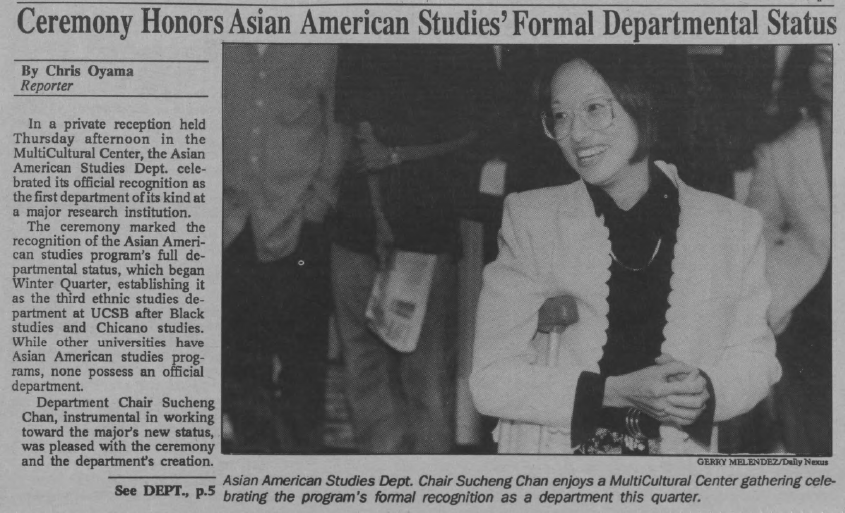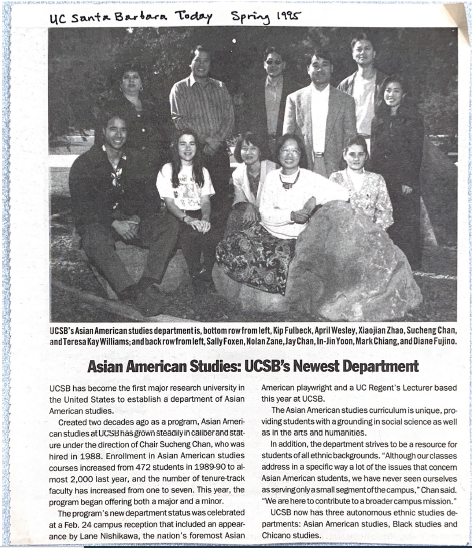by Angie Huynh, Jarel Park, Matthew McPherson, Teralyn Evans, Victoria Wang
In January 1995, UCSB became the very first Department of Asian American Studies at a major research university. That same year, our Department began offering a Bachelor’s degree in Asian American Studies. This research project examines the activism that lead to these significant changes.
The Asian American Studies program was established in 1972 after having been part of the Agency for Experimental Programs between 1969 and 1971. The 1972-73 UCSB General Log offers a general purpose of the Program:
“It is the purpose of the Program in Asian American Studies to provide a more general understanding of the Asian American experience. The goal is threefold:
- first, to offer Asian American students an opportunity to study and understand their heritage and history as an ethnic minority
- second, to offer other students an opportunity to enrich their knowledge of the Asian American
- third, to encourage the continual gathering, development and study of new knowledge regarding Asians in America.”
Yet between 1972 and 1988, the Asian American Studies program dealt with a series of setbacks. A lack of leadership prevented full course growth and a revolving door of overworked staff and a chronically unavailable director prevented the program’s growth. While Black Studies and Chicana Studies had both garnered department status and provide a Bachelor’s Degree by 1987, UCSB administration was contemplating merging the Asian American Studies Program with Asian Studies that same year.
Fortunately, due to student protest, the Asian American Studies program was not merged, and UCSB began an active search for a new director. Sucheng Chan formally joined UCSB in 1988, with the intention of reviving Asian American Studies and turning it into a robust department. With a background “analyzing the structure of power within societies and institutions,” Sucheng Chan worked to develop the program on multiple fronts. Starting with students, she helped coordinate with them in presenting and arguing for the Ethnic Studies requirement (which would be adopted in 1989). She guided and fought for professors and PhDs by offering them reading lists and housing incentives. Finally, with her history of course development at UC Santa Cruz, she collaborated with Asian American Studies professors to position the program as “multi-disciplinary” and establishing a framework that continues to this day.
With the adoption of the ethnicity requirement in 1989 and more professors in a variety of fields offering multidisciplinary classes across the program, attendance in Asian American Studies classes began to steadily rise to over 2000 students by 1994. It was also around this time when three students, Deirdre Howard, Que Dang, and Manhao Chhor expressed interest in an Asian American Studies major. Via Independent Studies, Chan was able to offer these student-scholars a proto-version of the major, hand designed by each student, complete with an intensive experimental survey or video project. There was indeed a demand for and interest in Asian American Studies, and it was becoming clearer that departmentalization for the program was the next big step in its growth and expansion.
By late 1994, Chan and faculty within the program sent a proposal for a B.A. in Asian American Studies to the Committee for Education Policy and Academic Planning (CEPAP). CEPAP praised and approved the framework, while students worked to garner 3,000 signatures from across campus to have it pass UCSB’s Academic Senate and send it to a UC system-wide committee. Their efforts paid off, with the UC system-wide committee reviewing the proposal and swiftly approving it without any complaints, ahead of UCLA’s proposal for a major. After the major was approved, Chan sent a memo to the Chancellor requesting Departmental status, which was formally granted on January 19th, 1995.
Thus, in the span of nearly a decade, Asian American Studies had gone from a program about to be terminated, to a robust department that was “independent, legitimate, and with plans for long-term survival.”


Back to main menu for History of Asian American Studies at UCSB
